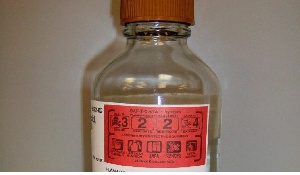Dear Right Honourable Speaker and Honourable Members of Parliament,
I hope this letter finds you all in good health and high spirits. I am writing to draw your attention to a pressing and deeply concerning issue that has recently come to the fore in our beloved nation: the rising incidence of acid attacks in Ghana. The deadly acids are increasingly being used as weapons for murder and maiming.
The Rising Threat of Acid Attacks:
In recent years, Ghana has witnessed a disturbing rise in acid attacks. These attacks leave victims with severe, life-altering injuries, causing unimaginable physical and emotional pain. Unlike other forms of violence, the effects of acid attacks are permanent, often resulting in blindness, disfigurement, and long-term psychological trauma. Furthermore, this heinous crime, often motivated by personal vendettas or domestic disputes, has severe consequences not only for the victims but also for society at large. It is imperative that we, as a nation, address this issue with the urgency it demands.
This article aims to shed light on the causes and consequences of acid attacks in Ghana and propose actionable solutions for the Parliament of Ghana to consider.
Causes of Acid Attacks:
Personal Vendettas and Domestic Disputes: Many acids attacks stem from personal conflicts, including failed relationships, jealousy, and revenge. In some cases, individuals resort to acid attacks as a means of inflicting maximum pain and disfigurement on their victims.
Gender-Based Violence: Women are disproportionately affected by acid attacks, making this issue a significant concern in the broader context of gender-based violence. Perpetrators often use acid as a weapon to assert control and dominance over women, leading to devastating physical and emotional trauma.
Lack of Strict Legislation: The absence of stringent laws specifically targeting acid attacks contributes to the prevalence of this crime. Without severe legal consequences, perpetrators may feel emboldened to commit such acts with impunity.
Easy Access to Acid: The relatively easy availability of acid on the market poses a significant risk. Acid, which is commonly used for industrial and domestic purposes, can be easily purchased and misused for violent purposes. The easy availability of it, which can be purchased without any regulation, has exacerbated this issue, making it imperative for us to act swiftly and decisively.
Consequences of Acid Attacks:
Physical Impact: Victims of acid attacks suffer from severe burns, disfigurement, and permanent disabilities. These injuries often require extensive medical treatment, including surgeries and long-term rehabilitation.
Psychological Trauma: Beyond the physical damage, acid attack survivors experience profound psychological trauma. They may suffer from depression, anxiety, and post-traumatic stress disorder (PTSD), which can hinder their ability to lead fulfilling lives.
Social Stigma: Survivors often face social ostracism and discrimination, further compounding their suffering. The visible scars left by acid attacks can lead to stigmatization, making it difficult for victims to reintegrate into society.
Economic Burden: The cost of medical treatment and rehabilitation for acid attack survivors can be exorbitant. Many victims are unable to afford the necessary care, leading to prolonged suffering and a diminished quality of life.
Proposed Solutions:
Legislative Measures: Acid attacks are a heinous crime, inflicting severe physical and psychological damage on victims. Like many other countries, acid attacks have posed a significant challenge to public safety and health. However, currently, there are no specific laws in Ghana regulating the sale or purchase of acids.
This regulatory vacuum has allowed these dangerous substances to be easily accessible, contributing to their misuse. It is crucial for our legal framework to catch up with this emerging threat and put in place stringent measures to
control the distribution and use of acids. Implementing robust legislative measures can play a crucial role in reducing or eliminating such incidents. The Parliament of Ghana must enact strict laws specifically addressing acid attacks. These laws should include severe penalties for perpetrators, regulations on the sale and distribution of acid, and provisions for compensation to victims.
Strict Penalties: Implementing strict penalties for acid attacks is crucial in deterring potential perpetrators. These penalties can include harsh sentences. Enforcing severe prison sentences for those convicted of acid attacks sends a strong message that such crimes will not be tolerated. Another is financial penalties. Imposing heavy fines on offenders can serve as an additional deterrent.
Restitution Orders are another. Requiring offenders to provide financial
compensation to victims can help address the long-term impact on survivors. Strict penalties ensure that there are serious consequences for committing acid attacks, thereby discouraging such criminal behavior.
Support Systems for Victims: Establishing comprehensive support systems for acid attack survivors is essential. This includes accessible and affordable medical care, psychological counseling, legal assistance, and social reintegration programs. Dedicated rehabilitation centers should be set up to provide holistic care to survivors.
Regulation of Acid Sales: The government should implement stringent regulations on the sale and purchase of acid. This can include mandatory licensing for sellers, keeping detailed records of buyers, and restricting sales to authorized individuals or entities. Licensing and registration of acid products are foundational steps in controlling their distribution and use. By ensuring that only authorized entities can purchase and handle acids, the government can create a traceable system that monitors the movement of these dangerous substances. The key elements of this approach include vendor licensing. Requiring vendors to obtain a license to sell acid ensures that only reputable businesses with proper safety measures can distribute these chemicals.
Another measure is purchaser registration. Mandating that buyers of acid products register their purchase helps create a record of who is obtaining these substances, making it easier to track and investigate any misuse. Other measures may include age restrictions (limiting the sale of acid to individuals above a certain age), quantity limits (restricting the amount of acid that can be purchased at one time), and purpose verification (requiring buyers to provide a legitimate reason for purchasing acid). These measures create a controlled environment where the sale and distribution of acid are monitored, significantly reducing the chances of unauthorized access.
Strengthening Law Enforcement: Law enforcement agencies must be adequately trained and equipped to handle cases of acid attacks. Prompt and thorough investigations, coupled with swift legal action, will serve as a deterrent to potential perpetrators.
Public Awareness Campaigns: Raising awareness about the gravity of acid attacks and their consequences is crucial. Government agencies, non-governmental organizations, and the media should collaborate to educate the public about the dangers of acid violence and promote gender equality and respect for human rights.
Secure Packaging and Labeling: Secure packaging and labeling play a vital role in preventing accidental and intentional misuse of acid. Measures in this area include tamper-proof packaging and clear labeling. These measures not only help in preventing misuse but also educate users on safe handling practices, reducing the risk of accidental harm.
International Precedents:
Countries like India, Bangladesh, and the United Kingdom have already enacted laws to regulate the sale and purchase of acids, significantly reducing the incidence of acid attacks. Ghana can draw on these international precedents to develop a robust legal framework tailored to our unique context.
Conclusion:
The disturbing incidence of acid attacks in Ghana is a call to action for all stakeholders, particularly the Parliament of Ghana. By understanding the root causes and consequences of this crime and implementing comprehensive measures, we can protect vulnerable individuals and build a safer society. It is time for Ghana to take decisive steps to eradicate acid violence and support the survivors who bear its painful legacy. The urgency of this issue cannot be
overstated, and swift action is imperative to ensure justice, healing, and prevention.
Call to Action:
I urge you, Honourable Speaker and Members of Parliament, to prioritize the enactment of stringent legislation against acid attacks, allocate resources for public awareness campaigns, and establish robust support systems for survivors. Together, we can make a difference and put an end to this egregious form of violence. Let us stand united in our commitment to justice and the protection of human rights.
Thank you for your attention to this urgent matter. I am confident that, under your leadership, we can enact the necessary laws to safeguard our citizens and uphold the values of justice and human dignity that define our nation.
Opinions of Sunday, 21 July 2024
Columnist: Cletus Siebune















